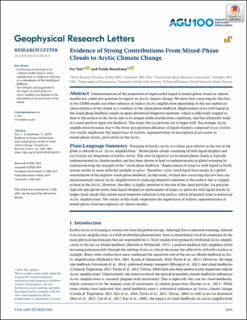| dc.contributor.author | Tan, Ivy | |
| dc.contributor.author | Storelvmo, Trude | |
| dc.date.accessioned | 2020-06-03T13:42:38Z | |
| dc.date.available | 2020-06-03T13:42:38Z | |
| dc.date.created | 2019-05-22T11:33:46Z | |
| dc.date.issued | 2019 | |
| dc.identifier.citation | Tan, I., Storelvmo, T. (2019). Evidence of strong contribution from mixed-phase clouds to arctic climate change. Geophysical Research Letters, 46(5), 2894-2902. doi: | en_US |
| dc.identifier.issn | 1944-8007 | |
| dc.identifier.uri | https://hdl.handle.net/11250/2656425 | |
| dc.description.abstract | Underestimation of the proportion of supercooled liquid in mixed‐phase clouds in climate models has called into question its impact on Arctic climate change. We show that correcting for this bias in the CESM model can either enhance or reduce Arctic amplification depending on the microphysical characteristics of the clouds as a corollary to the cloud phase feedback. Replacement of ice with liquid in the cloud phase feedback results in more downward longwave radiation, which is effectively trapped as heat at the surface in the Arctic due to its unique stable stratification conditions, and this ultimately leads to a more positive lapse rate feedback. The larger the ice particles are to begin with, the stronger Arctic amplification becomes due to the lower precipitation efficiency of liquid droplets compared to ice crystals. Our results emphasize the importance of realistic representations of microphysical processes in mixed‐phase clouds, particularly in the Arctic.
Plain Language Summary: Warming of Earth's Arctic at a faster pace relative to the rest of the globe is referred to as “Arctic amplification.” Mixed‐phase clouds consisting of both liquid droplets and ice crystals are ubiquitous in Earth's Arctic. The ratio of liquid to ice in mixed‐phase clouds is typically underestimated in climate models and has been shown to lead to underestimates in global warming by underestimating the strength of the “cloud phase feedback.” Replacement of cloud ice with liquid as Earth warms results in more reflected sunlight to space. Therefore, a low cloud liquid bias results in a global overestimate of the negative cloud phase feedback. In this study, we find that correcting this low bias can simultaneously reduce Arctic amplification by reducing longwave radiation to the surface that is trapped as heat in the Arctic. However, the effect is highly sensitive to the size of the cloud particles. Ice particles typically precipitate faster than liquid droplets so replacement of larger ice particles with liquid results in longer‐lived clouds that radiate more longwave radiation to the surface, which ultimately leads to enhanced Arctic amplification. The results of this study emphasize the importance of realistic representations of mixed‐phase cloud microphysics in climate models. | en_US |
| dc.language.iso | eng | en_US |
| dc.publisher | American Geophysical Union | en_US |
| dc.rights | Attribution-NonCommercial-NoDerivatives 4.0 Internasjonal | * |
| dc.rights.uri | http://creativecommons.org/licenses/by-nc-nd/4.0/deed.no | * |
| dc.title | Evidence of strong contribution from mixed-phase clouds to arctic climate change | en_US |
| dc.type | Peer reviewed | en_US |
| dc.type | Journal article | en_US |
| dc.description.version | publishedVersion | en_US |
| dc.rights.holder | © 2019 The Author(s) | en_US |
| dc.subject.nsi | VDP::Teknologi: 500::Miljøteknologi: 610 | en_US |
| dc.subject.nsi | VDP::Matematikk og Naturvitenskap: 400::Zoologiske og botaniske fag: 480::Økologi: 488 | en_US |
| dc.subject.nsi | VDP::Matematikk og Naturvitenskap: 400::Geofag: 450::Hydrologi: 454 | en_US |
| dc.source.pagenumber | 2894-2902 | en_US |
| dc.source.volume | 46 | en_US |
| dc.source.journal | Geophysical Research Letters | en_US |
| dc.source.issue | 5 | en_US |
| dc.identifier.doi | 10.1029/2018GL081871 | |
| dc.identifier.cristin | 1699443 | |
| dc.relation.project | European Research Council: 758005 | en_US |
| dc.relation.project | NASA: 1352417 | en_US |
| dc.description.localcode | Paid Open Access | en_US |

